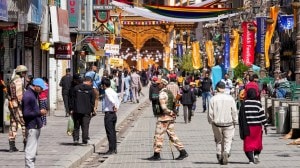Next war, we may cross LoC, says Army chief
NEW DELHI, JAN 7: Chief of the Army Staff General VP Malik has said he does not rule out crossing the LoC in future wars. At a seminar her...

NEW DELHI, JAN 7: Chief of the Army Staff General VP Malik has said he does not rule out crossing the LoC in future wars. At a seminar here yesterday, he called for a synergised politico-military and diplomatic approach in dealing with contingencies, insisting that the services be a part of all contingencies.
During the closing address at a national seminar on `The challenges of limited war; Parameters and Options’ (read in absentia by Major General V G Patankar since the chief is out of station), General Malik said the politico-military strategy for every limited war would be different. “Strategy adopted for Kargil, including the LoC constraints, may not be applicable to the next war,” he said.
He emphasised on a synergised approach, saying it was vital since future wars would inevitably have a backdrop of nuclear, chemical and biological warfare. We should be willing to change our structures, where necessary, and integrate experts in our decision-making processes at all levels, he said.
He said surprise and unpredictability are the basic elements of war. Therefore, notwithstanding the trend towards limited wars, it would be prudent for the nation to remain operationally prepared for the entire spectrum of war from proxy to an all-out one. “There is greater likelihood of limited wars in the future than that of all-out or general wars,” he said. He also called for security issues to be given “due consideration” in the formulation of policies, especially foreign policy.
Military operations, diplomacy and domestic environments would have to be orchestrated with fine judgement for a successful decisive outcome, the General said. He said there was also a link between deterrence and escalation. “We were able to keep the Kargil war limited primarily due to nuclear as well as conventional deterrence,” he said. Though Pakistan escalated it from the proxy war level, we tackled it at the level of a limited war. “There was complete consensus between the various organs of the government; political control, military actions and pro-active diplomacy,” he said.



- 01
- 02
- 03
- 04
- 05



























